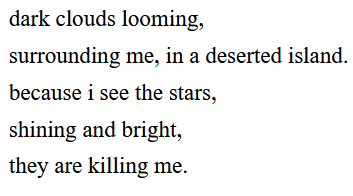Wordy Blog Archive 2011-08
Today's Wordy English: massif
http://wordy-english.blogspot.com/2011/08/massif.html
Now, for you literature and humanity fans, this lil' passage can take you a hour or days to digest. Look up each author entry in Wikipedia. See who they are, what they've done. And, if novel reading is your cup of tea, head over to that original Time mag article and head down to bookshop online and prepare for years worth of reading.
Today's Wordy English: duomo, belvedere
http://wordy-english.blogspot.com/2011/08/duomo.html
Remember, sip the words like fine wine. Wallow in their history. They are not just words. They are encoding of humanity. Spend at least 1 min to read the link to wikipedia if these words are new to you.
It is these little inquisitiveness, that makes you wealthy and sound, in judgment of any current hot political issues. Without interest in remote parts of humanities, you are really know-nothinger.
Today's Wordy English: decorum, and horn your skills in writing, thinking.
http://wordy-english.blogspot.com/2011/08/decorum-and-horn-your-skills-in-writing.html
Remember, you don't know the word unless: when you see a word, without any context, you can give its definition that roughly matches a dictionary's.
For non-native english speakers or english-as-second-language learners, you should remember the words you've learned in the past. Keep a list of words you learned in the past, go thru it everyday, cross out those that you can always give a definition.
For native English speakers, college students, writers: when you give a definition of a word, you want to horn your skill such that your definition is precise and accurate, as if it is from a (non-abridged) dictionary. Understanding a word fully is different from the ability to give its definition in writing. Ability to write definition is a non-trivial skill. For example, the word “decorum”. Most college educated english speaker know what it means. If you ask me, i might say it's “proper manners”, “etiquette”, which is correct. However, if you are writing a definition for a dictionary, it's not easy. “proper manners”, “etiquette”, isn't precise nor broad enough. Now look up a non-abdidged dictionary and see the difference.
If you are into literature and creative writing or poetry writing, then do practice defining words. You will improve your writing kill and thinking skill, learn the word's history, original context (etymology), and also pickup many linguistic issues and logical analysis.

Third Person Writing for Author Profile
On Google Plus i do hate those who write their own profile in third person. Like:
Dr. Xah Lee is professor of philology at University of Bovine. He is a renowned programer and philosopher. He has helped tens of thousand people to better themselves. He has won several awards, and is a recipient of Noble Prize. He is also SEO of Grandiloquence International. He is nominated as the Savior of the Year 2020.
Rule: If you write it yourself, don't third person it.
If anyone doesn't know, vast majority of such, actually i think all of it, in book covers, journal article intro, etc, are written by the person himself. I haven't researched the history of this practice per se, but this convention established precisely for the purpose to make it sound neutral and true, and they do that to sell the journal/book. In short, it's a marketing gimmick!
Chinese Linguistics: 奇葩異草, 百卉千葩
Ok, found a reasonably good English dictionary add-on for Firefox. For detail, see: Online English Dictionary Tools. (including tools for Google Chrome and emacs.)
Chinese 灵=靈; What's a Good Simplification?
See: 繁體简体字优劣表; Good / Bad Simplified Chinese Characters
Unicode: Punctuation and Printer's Symbols † ¶ © ® ™ ☙
The Multitudes of “no”
The human animals, have invented many equivalent terms for “no”. I suppose this is a phenomenon of language that is a result due to the psychology in human interaction. Namely, when someone asks you something, if your answer is negative, usually you want to avoid actually answer them directly, out of politeness or to facilitate rapport. There are a thousand ways to indirectly say no, but in many situations you need to be brief and can only utter one word, so we have came up with: nah, nay, nope, uh uh (what's the proper spelling here?), negative, nu (this i learned in second life).
The "Nuuu" from second life is particularly funny. It is this Nu that prompted me to think about this, when i first heard of it in SL. If you are not a Second Lifer, the "nuu" is often said in some furry community, by a gesture, usually from some cute female furry.
SL is quite rife in all sort of slang development…
…i think there should be a lot more synonyms to “no”… will have to look into some other time.
To further this theory about why there's many synonyms to “no”, i think here's some steps:
- (1) first, actually collect all the “no” synonyms, so we can be sure there are many.
- (2) actually collect synonyms of Yes too. If there are equal or even more synonyms of Yes than “no”, then this theory apparently fails.
While doing this, be sure to lookup etymology of each. Should be quite rich. It be also interesting to quickly check other major lang. That should quickly give a over all picture.
Abomination of Chinese Simplified Character 讲=講
See: 繁體简体字优劣表; Good / Bad Simplified Chinese Characters
Google Shuts Down its Dictionary Service
Chinese Character 喬
乔=喬
This is a rare character. Sometimes used in person's name.